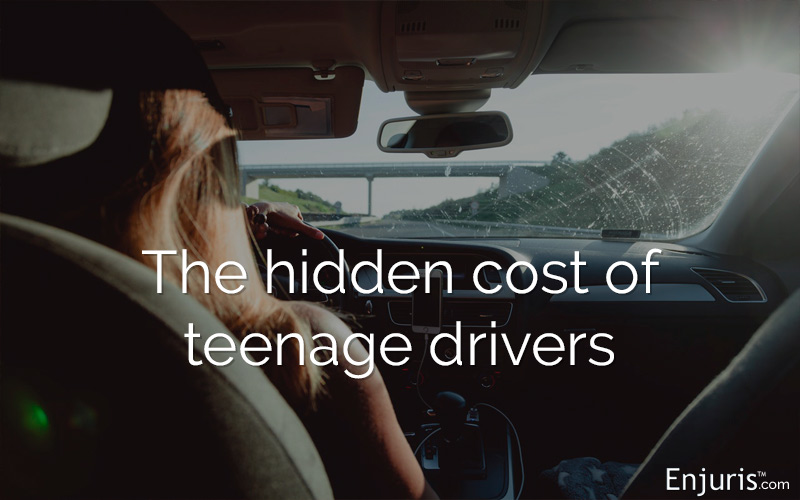Hablamos español.

Can parents be sued if a teen driver causes a crash in Texas?
There are few things more stressful than being the parent of a teenager. Though your youngster undoubtedly brings you a great deal of joy, their newfound independence—embodied by their brand new driver’s license—comes with some questions and concerns.
Are teens more likely to get into car accidents than adults?
Can teen car accidents be prevented?
Are you responsible for the damages caused by your teen if they get into a car accident?
Here at Enjuris, we want to eliminate some of the stress associated with parenting a teenager. With that in mind, let’s take a look at some of the issues surrounding teen driving in Texas.
Teen car accident statistics
Motor vehicle crashes are the leading cause of death for teens in the United States. In 2017, 2,433 teens ages 16-19 were killed, and 292,742 teens were treated in emergency departments for injuries suffered in motor vehicle crashes.
To put this in perspective, 16-17-year-old drivers are 9 times more likely to be involved in a crash than adults, and 6 times more likely to be involved in a fatal crash.
Unfortunately, Texas isn’t immune to this problem. Among all states, Texas consistently ranks 1st with respect to fatal crashes involving drivers ages 15-20.
Some of the factors that lead to teenagers being particularly prone to car accidents include:
- Lack of experience
- Less developed ability to recognize hazards and adapt
- Tendency to follow more closely than other drivers
- Tendency to drive faster than other drivers
- Tendency to be more affected by alcohol
Are parents liable for damages caused by your teen’s car accident?
Many states follow the family car doctrine, which states that the owner of a vehicle is liable for damages or injuries resulting from a car accident, even if some other member of the family (such as a teenage child) is driving the vehicle—regardless of whether or not the owner gave permission.
Texas doesn’t follow this rule.
Rather, Texas follows the negligent entrustment doctrine. The negligent entrustment doctrine states that a vehicle owner can be held liable for the negligence of the person whom they entrust with their vehicle (such as their teenage child) if the following elements are proven:
- The owner allowed some other person to use their vehicle,
- The owner knew or should have known that the person entrusted with the vehicle was unliscensed, incompetent, or a reckless driver, and
- The person entrusted with the vehicle negligently caused the car accident.
Example of negligent entrustment
Jane Wolford, owner of a Chevy pickup truck, sold a horse trailer and agreed to deliver the trailer to the buyer. Because she had a prior engagement, Jane asked Olivia, her 17-year-old daughter, to deliver the horse trailer to the buyer using Jane’s Chevy pickup truck.
Jane was aware that her daughter had received 2 speeding tickets and been in 4 car accidents in the 12 months since receiving her driver’s license. All 4 accidents were Olivia’s fault and 2 of them resulted in serious injuries to the passengers. What’s more, Olivia had never towed a horse trailer (or any other type of trailer) before.
With the horse trailer in tow, Olivia was speeding down Route 90 in San Antonio when she braked suddenly. The horse trailer jackknifed, causing an accident with a station wagon. The driver of the station wagon suffered serious injuries and sued both Olivia and Jane.
In this hypothetical, is Jane, Olivia’s mother, liable for the damages?
Probably. Jane allowed Olivia to use her vehicle despite knowing that Olivia was a reckless driver or, at the very least, not competent to tow a horse trailer. Olivia was subsequently negligent and caused the accident.
What can you do to keep your teen safe?
The best way to avoid being liable for your teen’s accident is to keep them from getting into an accident in the first place.
The National Highway Traffic Safety Administration has some tips for keeping your teen safe:
- Share some teen driving statistics with your teen (the sobering statistics listed at the beginning of this article are a good place to start)
- Set consequences for bad driving behaviors (such as texting while driving or speeding) and follow through on them
- Set a good example when you’re driving
- Remind your teen that drunk driving is illegal and show them the statistics
- Don’t allow your teen to drive if you think they may be too tired (for example, consider picking them up after a lengthy athletic event rather than allowing them to drive themselves home)
- Limit nighttime driving and peer passengers until after the first full year of independent driving
The Texas organization I Drive Safely also recommends entering into a driving contract with your teen that lays out your respective duties and expectations.
If your teen is involved in a car accident, consider contacting a Texas personal injury attorney to explore your legal options.
Sources
Centers for Disease Control and Prevention, Teen Driver Fact Sheet
National Highway Traffic Safety Administration, Young Drivers
Williams v. Steves Industries Inc., 699 S.W.2d 570 (Tex. 1985)
See our guide Choosing a personal injury attorney.

